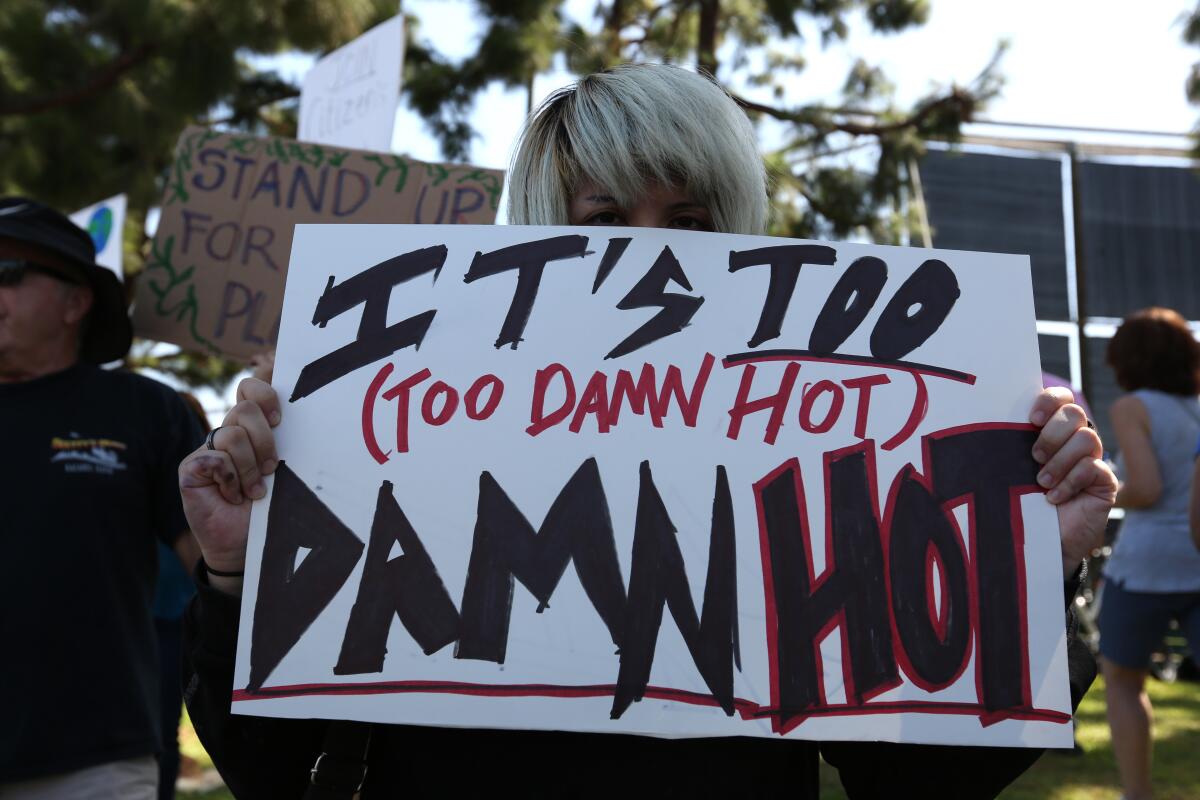Commentary: Join the Costa Mesa council and members of the O.C. delegation in supporting climate bill

How we name or characterize a problem can determine the way we understand it, relate to it and ultimately solve it. The problem commonly referred to as global warming or climate change illustrates the point.
The cause of this problem is carbon pollution, which results in pandemic-like human suffering worldwide. If we framed this problem as a “carbon pollution pandemic,” public attention would become focused where it belongs, on the toxic and heat-trapping emissions from burning coal, oil and gas. If characterized this way it would galvanize the urgency we face, improve public understanding of the problem and lead policymakers to effective solutions.
Rather than referencing its most vague and abstract-seeming effects, such as, a warming planet or a changing climate, “carbon pollution pandemic” draws attention to the unrelenting, pervasive emissions emanating from familiar things: cars, trucks, trains and planes, home heating and cooling systems, and industrial smokestacks.
The scale of the suffering and death caused by carbon pollution is shocking. In the most recent year thoroughly studied, 2015, according to U.S. News and World Report, carbon pollution alone caused 8.8 million premature deaths.
And, more than that, because of the heat-trapping nature of these emissions, we must account for untold additional suffering and death from rising sea levels, heat waves, droughts, floods and extreme weather events.
A clear focus on carbon emissions would help lead the public and policymakers to target solutions that reduce or eliminate them. This means policies that gradually phase-out the use of fossil fuels and encourage investment in clean energy.
While policymakers may be drawn to utilize government programs, such as subsidies or regulatory control, no policy would transition us more efficiently and effectively away from fossil fuels to a clean-energy economy than putting a price on carbon pollution.
To that end, scientists, economists, business leaders and politicians are coalescing around a policy approach called carbon fee and dividend. Under this policy demand for these fuels would diminish, alternatives would gain a competitive advantage, other nations would be incentivized to adopt similar policies, and tax revenue collected from the polluting industries and rebated to American households, would ease the costs of the transition.
Four bipartisan bills before Congress offer variations of this approach. The most popular one, The Energy Innovation Act, HR-763, has 81 co-sponsors, including Orange County Reps. Harley Rouda (D-Laguna Beach), Katie Porter (D-Irvine), Mike Levin (D-San Juan Capistrano), Gil Cisneros (D-Fullerton) and Lou Correa (D-Anaheim), plus the endorsement of the city councils of Santa Ana and Costa Mesa. It aims to reduce emissions 45% in 12 years and 90% by 2050. If enacted this legislation would literally clear the air and pay for itself.
Because our efforts to contain COVID-19 have virtually shut down our economy, Congress is now considering stimulus legislation to get people back to work and re-start our economy. No doubt trillions of dollars will be allocated. We can either continue to prop up the fossil-fueled economy, locking in carbon pollution which scientists warn will cause certain catastrophe, or we can begin now to fund the transition to clean energy.
The writer lives in Newport Beach.
All the latest on Orange County from Orange County.
Get our free TimesOC newsletter.
You may occasionally receive promotional content from the Daily Pilot.



